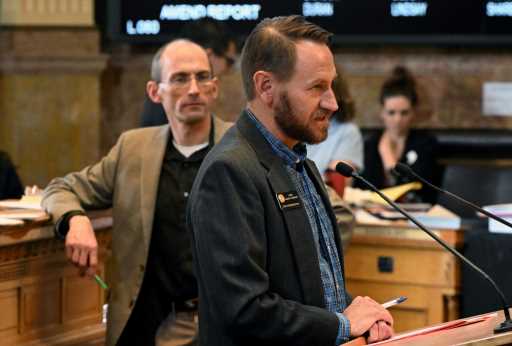Colorado property tax, TABOR refunds, rental assistance
As sounds from Cinco de Mayo celebrations echoed across the street from the Colorado Capitol this past weekend, Democrats in the state legislature pushed along a slate of bills that could nudge Colorado tax policy in a more progressive direction, advocates said.
A policy unveiled Saturday would again return taxes collected over the limit set by the Taxpayer’s Bill of Rights, or TABOR, evenly across all eligible Coloradans next year; an amendment attached to a sister bill Sunday would set aside money specifically for rental assistance — if a decade-long change to property tax rates goes into effect.
In the background is Monday night’s looming constitutional deadline for lawmakers to finish their work. The tight timeline brought the Senate into session on a Sunday for the first time in more than 80 years, according to a Republican staffer.
The policies so far weathered criticism from the GOP — a super minority in the state House of Representatives and near super minority in the Senate — over the perceived rush and calls from the party’s leadership for a special session to further consider the proposals. Democrats have countered that the proposals have been worked on in the background for weeks and will see ample vetting when the electorate decides on the package, dubbed Proposition HH, in November.
Analysts with the progressive Colorado Fiscal Institute say the policies, if approved this fall, will work together to take at least a “small step” toward a tax policy that specifically benefits lower-income Coloradans.
A flat TABOR refund mechanism, as proposed under HB23-1311, is “definitely more progressive” than the default income-based system, Colorado Fiscal Institute Legislative Coordinator Caroline Nutter said.
Under the proposal, every eligible Coloradan would receive an estimated $661 as their share of some $2 billion in surplus tax collections. The default six-tiered system gives wealthier Coloradans a bigger share, under the theory that they paid more taxes, and thus owed more back. (Though that system has its critics, including from Democrats last year, that it returns more money to those who don’t need it as much.)
Meanwhile, the property tax proposal tied to that one, SB23-303, seeks to blunt the increase facing property owners due to skyrocketing property valuations. It would cut $40,000 from the base valuation — a cut felt deeper for lower-valued homes than pricier ones — while also trimming the percentage used to determine what’s owed. But it didn’t touch renters beyond the hope that landlords would have fewer costs to directly pass on to tenants. Nutter’s research doesn’t indicate if landlords generally do or don’t pass on savings.
Democratic lawmakers on Sunday sought to fix that with an amendment to the proposal that would set aside some of the extra money collected under a higher TABOR cap specifically for renters.
With the multiple pieces taken together — cutting a chunk from the assessed value, setting aside money for renters, and flattening TABOR refunds — “I do believe overall that this is going to do a lot for lower-income people who are really having a hard time keeping up with the cost of living,” state Rep. Chris deGruy Kennedy, a Lakewood Democrat and sponsor, said.
The language on the renter’s amendment was largely similar to that of an amendment offered by state Sen. Barbara Kirkmeyer, a Brighton Republican, earlier in the debate. She forced that vote Wednesday, where it died on a tie, and she chided the Democrats for taking her proposal after many rejected it last week.
Still, she and the rest of her caucus attacked the proposal as a workaround on TABOR caps in general and something that will eat into rebates in the future. Sen. Paul Lundeen, the Republican leader in the chamber, called flattening the TABOR refund for a year to change the tax structure for a decade “incentivizing the people to vote against their own best interests.”
Michael Fields, president of Advance Colorado and advocate for fiscal conservatism, likewise argued this proposal is trying to “deceive people” into giving away TABOR refunds in the future. Voters need to vote yes to flatten the TABOR refund formula and see cuts to the property tax formula, and in return they let the state keep more taxpayer dollars. Backers say the extra tax revenue is needed to fund local services and education that could otherwise take a hit from lower property taxes.
That argument has seen its own criticism, with groups representing property tax-funded local entities worrying the backfill wouldn’t cover expenses.
“We are concerned that the arbitrary limits on counties will reduce their ability to provide mandated services and to meet needs that are not mandated that Coloradans look to counties to provide: affordable housing, child care and behavioral health solutions,” Gini Pingenot, director of external affairs for Colorado Counties Inc., said.
Fields plans to challenge the proposal in court ahead of the November election and campaign against it in the meantime. He called it “just a bad deal for all Coloradans, regardless of whether they’re wealthy or not.” Wealthy Coloradans stand to lose the most from their TABOR refunds.
Kathy White, executive director of the Colorado Fiscal Institute, noted that property owners will still see a long-term cut to property tax rates under this proposal, versus the short-term boost to TABOR refunds that less wealthy Coloradans will see.
She and her group advocate to make the change permanent — a move deGruy Kennedy said he aims to make next legislative session. DeGruy Kennedy noted that, in general, there’s more work to be done on making the state’s tax system less burdensome for the poorest Coloradans.
“Colorado’s tax system is still incredibly regressive,” deGruy Kennedy said. “We’re a very low property tax state in general, we’re a pretty low-income tax state in general, and we have a pretty high sales tax rate in general. That combination of factors leads to poor people paying a larger share of their income in taxes than wealthier people.”
Source: Read Full Article

